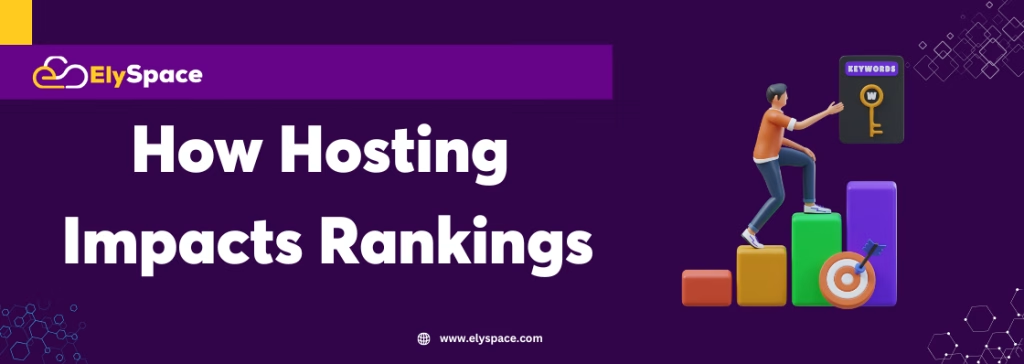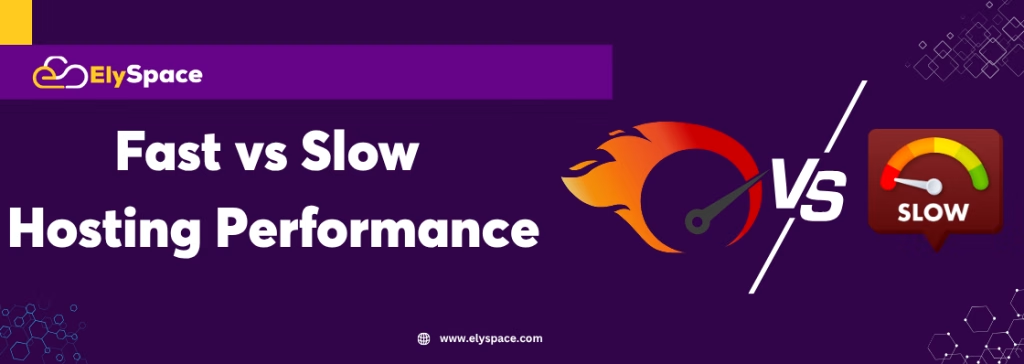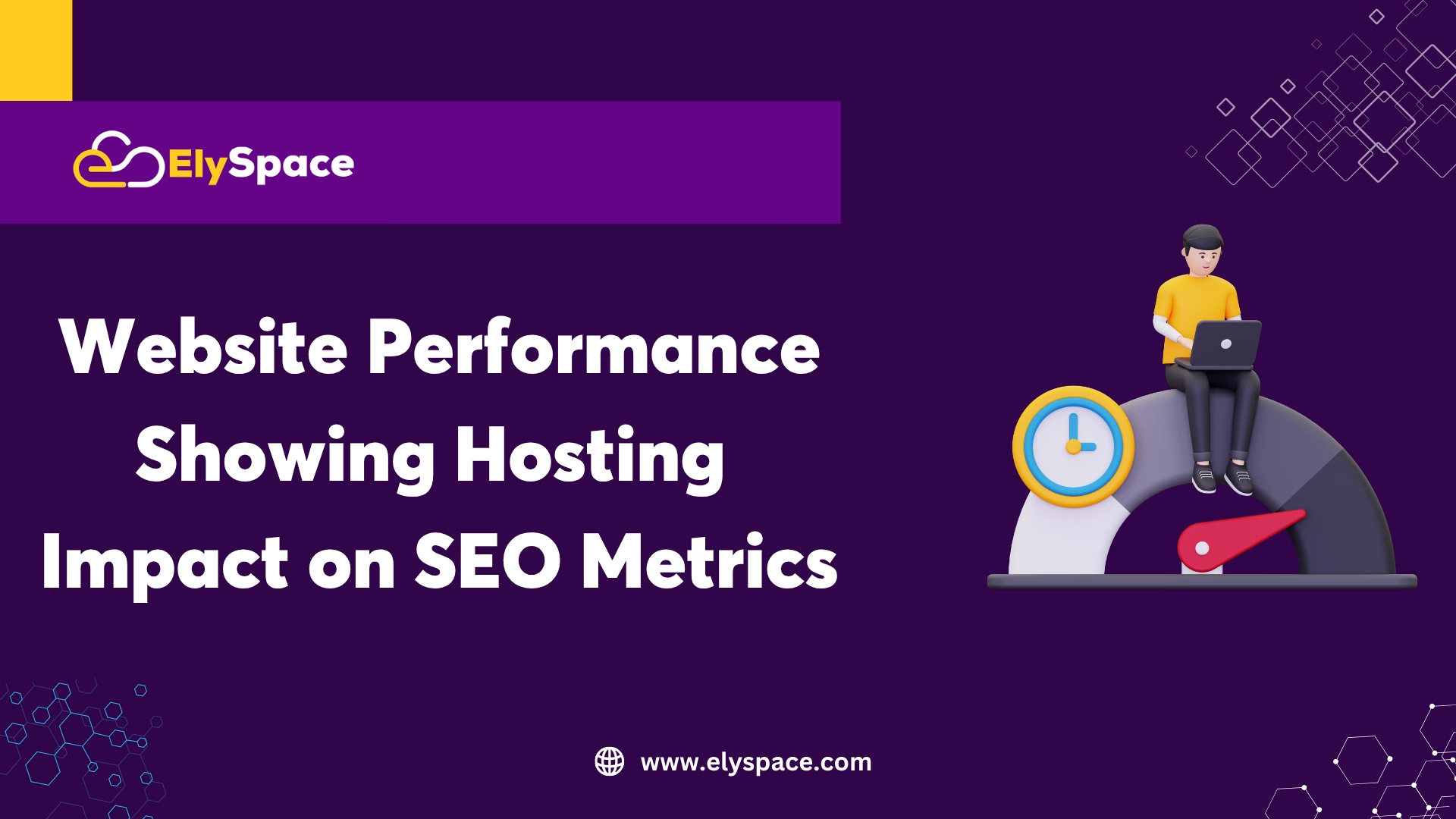The role of your web hosting company/host is a major player in SEO success that many people ignore. Of course content and keywords are important, but your Hosting Provider Affects SEO Performance and make impact on search rankings based on speed, uptime and security. Google pays attention to these factors in user experience and engagement, ultimately impacting a site’s traffic and relevance.
With its new Core Web Vitals update, we can see that the significance of hosting and SEO has become heightened. The newest update states that technical performance is now one of the primary sources of audience ranking. Your choice of hosting can either support and enhance your SEO efforts, or it can destroy your efforts entirely.
Even if you have put in the work creating content and optimizing for keywords, poor hosting can limit your success. A slow server, poor uptime, or lack of basic security (such as HTTPS) can provide a poor user experience, which search engines are now penalizing more and more.
Fast loading sites reduce bounce rates. Good user experience can improve both the likelihood of visitors staying on your website longer and your chances of ranking better on Google SERPs (Search Engine Results Page). Alternatively, if your website takes too long to load (more than just a few seconds), people may leave before they ever have a chance to see your content. Leaving a site before seeing any of the page content sends a signal to the search engines that the site isn’t important or trustworthy.
Uptime is extremely important as well. If your site spontaneously crashes or is down because of unreliable hosting, search engines will find it hard to index your pages regularly. The search engines do like to index your site quickly when updated and the hosting you’ve selected could undermine that in addition to hurting your site credibility in the user’s eyes.
Security is also important. Google sees unsecured sites as unsafe. This can scare users away and hurt your brand trust. The best hosting providers should offer some type of bundled security; malware scanner, firewall protection, secure and daily backups, etc. These factors all indirectly improve SEO by helping to protect your site and your data and thus assisting to protect your site rankings, and trust, with users.
How Hosting Impacts Rankings
No less than 200 ranking factors are used by Google, many of which are directly impacted by your host. Speed, uptime, security protocols, location of the server for the code, etc., all play a measurable role in your search engine rankings.

Google ranking factors infographic highlighting hosting-related SEO elements including site speed, uptime, security, and server performance
The Core Web Vitals Largest Contentful Paint (LCP), First Input Delay (FID), and Cumulative Layout Shift (CLS) , are heavily affected by the performance of the hosting provider. If your host is slow or has downtime, no amount of optimization will lead to good scores on Core Web Vitals.
Search engine crawlers need to be able to reliably crawl your website when they have the opportunity. If their crawler finds your website is often down, then they will consider that website unreliable and lower your rankings accordingly over time due to crawl budget issues.
Website Speed: Speed Matters
Of all the ways that hosting impacts SEO, page loading speed is the most significant. Time and time again, Google has made it clear that page speed is a ranking factor, and studies confirm that faster websites rank higher on Google than slower websites.

Website speed test comparison showing fast-loading site on premium hosting versus slow site on budget hosting with performance metrics
Server response time, or Time to First Byte, serves as the foundation of all loading performance. The best hosting service providers strengthen their servers, use SSD storage, have caching systems in place, and can offer enough resources to reduce response time.
Here are the key speed-related factors that hosting have control over: –
Server Processing Power and Memory
CDN Integration
Caching Mechanisms (If Any)
Image Optimization Features
Database Optimization
Server Availability and Reliability
Website availability (or uptime) plays a direct role in your SEO through several means. Google performs regular crawling of websites for the purpose of indexing, so having downtime blocks like periods of no access to your website can substantially decrease crawl opportunities and indicate to Google cries ‘lower quality’.
Uptime considerations include
Decreased crawl budget
Poor user experience indicators
Reduced opportunity for indexing
Less trust from search engine results

Server uptime monitoring dashboard showing availability statistics and reliability metrics for SEO-optimized hosting performance
Quality hosting services will guarantee uptime in the 99.9%+ range or provide proactive monitoring and engagement towards minimizing downtimes to the best of their ability to maintain as much “available” time on the site as possible.
Security and SSL Certificate Impact
Website security to impacts your search ranking. Google has made HTTPS, or having a valid SSL certificate part of its ranking factor for search results and it displays a warning message to users if a site is not secured, that a SSL certificate is the minimum viable security necessary.
Security and SSL features that affect your SEO:
SSL Certificates installation and management
Malware scanning and removal
DDoS protection features
Access to security updates
Secure web application (based on a WAF) firewall protection
Security incidents result in “punishing” SEO damage from Google penalties for violating webmasters guidelines, as well as impacting Trust of users towards your website.
Server Location and Geographic SEO
Server location can influence search rankings based on user experience and geographic relevance signals. Servers closer to the end user are more likely to deliver content in a faster, more responsive manner, positively influencing Core Web Vitals metrics.

Global server location map showing hosting geographic distribution impact on regional SEO performance and user experience
There are several geographic factors to consider for a new server location:
Delivering content to a target audience faster
Regional search ranking preferences
Legal jurisdiction around local data regulations
International SEO opportunities
Hosting Type and SEO Performance
Different hosting types will provide varying levels of SEO performance potential. The lead types of hosting include:
Shared Hosting: Least expensive hosting option with limited resources. These limitations can create performance challenges around traffic spikes.
VPS Hosting: As a dedicated VPS hosting accountability, a user can expect a more consistent performance level and have greater control over performance optimization.
Dedicated Servers: Maximum performance, control, and resources provides the opportune setting to leverage advanced elements of SEO performance optimizations.
Cloud Hosting: Cloud-hosted websites are scalable with a performance advantage by distributing services globally for international-defined SEO traffic.
Mobile Performance

Mobile website performance testing showing loading speeds across different devices and hosting configurations for mobile SEO
Mobile-first indexing suggests Google and their ranking evaluations predominantly leverage the mobile versions of web pages. With that in mind, hosting must provide good mobile performance and can include:
Mobile-optimized server configurations
Accelerated Mobile Pages (AMP)
Progressive Web App (PWA)
Mobile performance indicators
Technical SEO Infrastructure
Relying on host support is critical to modern SEO:
– HTTP/2 and HTTP/3 server support.
– Server-side optimization features, if available.
– Development and staging environments.
– Database optimization tools.
– CDN integration.
Great hosts will have some features that support built-in optimization to help with the technical implementation of SEO that will not require advanced technical knowledge.
Common Hosting Mistakes That Hurt SEO
Some mistakes can be costly:
– Price based hosting – cheap providers may not support SEO features.
– Location – the wrong location can hinder your regional SEO.
– SSL – skipping over SSL can result in Google penalties.
– Mobile – ignoring mobile performance can affect mobile-first indexing.
– Performance – performance monitoring neglect can precede issues without awareness.
How To Pick SEO Friendly Hosting
Review your hosting provider based on the following:
Performance Criteria:
– Server response times less than 200ms.
– Uptime guarantees greater than or equal to 99.9%
– SSD storage and sufficient hosting resource.
– Built-in caching capabilities.

SEO performance analytics dashboard displaying correlation between hosting metrics and search engine ranking improvements
SEO Features:
– Free SSL certificates.
– CDN integration.
– HTTP/2 support.
– Mobile optimization tools.
– Security features.
Support Quality:
– At least some technical expertise, not necessarily on sound infrastructure.
– Accessibility as needed.
– Presence of staff that understand SEO.
– Will assist with migration when required.
Evaluating Hosting Impact on SEO
To evaluate hosting impact on SEO, you must evaluate:
Core Web Vitals
Loading speeds
Server uptime
Correlations to search rankings
Changes to traffic and conversions
Use some services like Google Search Console, GTmetrix or Pingdom to quantitatively evaluate hosting performance in relation to SEO, to bolster optimization.
Advanced Hosting Optimization
All of the above suggestions can help improve your hosting SEO performance – especially:
Server caching
Image optimization services
WIFI with HTTP/3
Server configuration
Security features
The listed optimization methods are all included with hosting providers, to give the SEO a competitive advantage.
Future-Proof Your Hosting

illustration of modern web hosting infrastructure with AI, green energy, and advanced security features to represent future-proof hosting solutions
When trying to future-proof your hosting, for example, look for hosting providers that are investing into:
New web technologies
AI optimization
Security features
Sustainability
Privacy addressed
Conclusion
Your hosting provider affects SEO performance in terms of speed, uptime, security, and technical capacity. A quality hosting service provides the best possible base for SEO success but a terrible service can obliterate any positive effects of excellent optimization.
The investment you make in hosting that will positively influence your SEO objectives based on consistent performance, security features, and a variety of optimization tools, is extremely valuable. The costs associated with a quality hosting service will be dwarfed by the SEO and outcomes in business goals that may arise from it.
For businesses who are serious about SEO success, hosting providers should be considered investment items rather than a commodity item. When selecting a hosting provider you should consider how well the provider understands your SEO requirements, and whether they offer features that will assist you with your search engine optimization goals.
Far too often, businesses view hosting as an afterthought, simply choosing the bare minimum plan they can find to drive down expenses without thinking about the long-term implications. In reality, your website’s infrastructure is just as important as the content CP. Let’s put it this way: your hosting company is the foundation of your website. No matter how great the design, if the foundation is faulty, it won’t last long Trait #2 a reputable hosting provider will provide you with more than just server space; they should offer integrated CDN support, caching solutions, resources that scale based on demand, and server-side performance features. Things like HTTP/3 or NVMeCurve flash storage are not just for performance but are directly related to the page experience metrics for which Google is now actively collecting, measuring and rewarding.
Also, support matters. When issues arise – whether it is downtime, a bottleneck in performance, or maybe a security breach – it can make all the difference to have access to knowledgeable, reliable and responsive support to help prevent a minor hiccup from becoming an SEO concern.
Commonly Asked Questions
How much influence does hosting have on SEO rankings?
Hosting affects SEO with site speed, uptime and security factors that are critical. If your hosting service is poor, it may account for a 30% or more diminished level of search visibility. A good hosting service is the foundation on which your strong SEO performance will sit.
Which hosting features are most important for SEO?
Some critical features to pay attention to are server response times below 200ms, 99.9+% uptime, SSL certificate support, Content Delivery Network (CDN) integration, HTTP/2 protocol, and sufficient resources to budget your performance consistently.
Should I consider the location of servers when selecting hosting?
The location of servers may impact your local search engine optimization and your users’ experience, as it may serve them content faster. It is advisable to select hosting service with servers that are closer to the audience you are targeting, while typically, this will yield the best performance for all users, and may yield regional ranking advantages.
Can shared hosting negatively affect SEO?
Shared hosting can negatively affect SEO, although this isn’t the whole picture. While a good shared hosting will typically be fine for smaller sites when it comes to SEO impact, a bad shared host could create performance issues all putting the SEO rankings at risk.
How do I know if my hosting is causing SEO problems?
Look at your Core Web Vitals scores and page loading speeds, uptime stats and if you’ve seen a ranking change. You can use tools like Google Search Console, GTmetrix, and Pingdom to confirm if you have a hosting-related SEO issue.
Can changing hosting improve my SEO?
Yes, changing to a better hosting provider can improve SEO performance. If your hosting doesn’t provide speed, uptime or security, switching will help SEO performance. Expect to see improvements gradually over 3-6 months for search engines to recognize better performance improvements.

